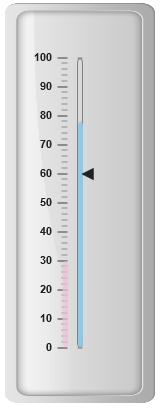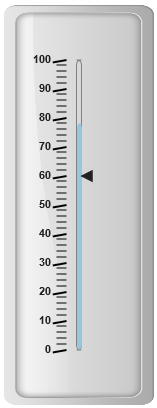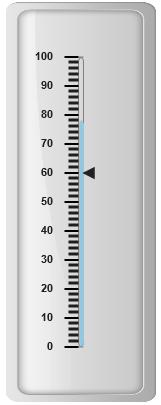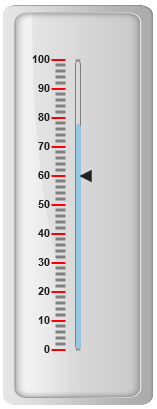- Adding tick collection
- Tick Customization
- Types
- Positioning the ticks
Contact Support
Ticks
10 Jan 201817 minutes to read
Ticks are used to mark some values on the scale. Based on the tick’s value you can set the labels on the required position.
Adding tick collection
Tick collection can be directly added to the scale object. Refer the following code example to add tick collection in a Linear Gauge control.
<div id="LinearGauge1"></div>$(function () {
//For Linear gauge rendering
$("#LinearGauge1").ejLinearGauge({
enableAnimation: false,
//Adding frame object
frame: {
innerWidth: 8,
outerWidth: 10,
backgroundImageUrl: "../images/gauge/Gauge_linear_light.png"
},
value: 78,
//Adding scale collection
scales: [{
width: 5,
backgroundColor: "transparent", type: "roundedrectangle",
border: { color: "Grey", width: 1 }, showBarPointers: true,
//Adding label collection
labels: [{ distanceFromScale: { x: -25, y: 0 } }],
//Adding marker pointer collection
markerPointers: [{ width: 10, length: 10, value: 60 }],
//Adding bar pointer collection
barPointers: [{ width: 5, backgroundColor: "#95C7E0" },
{
width: 6, backgroundColor: "#EDC1D7",
distanceFromScale: -15, value: 30, opacity: 0.7
}],
//Adding tick collection
ticks: [{
type: "majorinterval", width: 2,
color: "#8c8c8c", distanceFromScale: { x: -10, y: 0 }, position: "far"
},
{
type: "minorinterval", width: 1, height: 6,
color: "#8c8c8c", distanceFromScale: { x: -10, y: 0 }, position: "far"
}]
}]
});
});Execute the above code to render the following output.

Tick Customization
Appearance
-
Height and width of the ticks can be applied by using the properties
heightandwidth. You can customize ticks with the properties like angle, color, etc.angleattribute is used to display the labels in the specified angles andcolorattribute is used to display the labels in specifiedcolor. -
Ticks are two types such as major and minor. The opacity of the labels can be adjusted with the property
opacity. The opacity values lies between 0 and 1.
<div id="LinearGauge1"></div>$(function () {
//For Linear gauge rendering
$("#LinearGauge1").ejLinearGauge({enableAnimation:false,
//Adding scale object
frame: {
innerWidth: 8,
outerWidth: 10,
backgroundImageUrl: "../images/gauge/Gauge_linear_light.png"
},
value: 78,
//Adding scale collection
scales: [{
width:5,
backgroundColor: "transparent", type: "roundedrectangle",
border: { color: "Grey", width: 1 },showBarPointers: true,
//Adding label collection
labels: [{ distanceFromScale: { x: -25, y: 0 } }],
//Adding marker pointer collection
markerPointers:[{width:10,length:10, value:60}],
//Adding bar pointer collection
barPointers: [{ width: 5, backgroundColor: "#95C7E0" }],
//Adding ticks collection
ticks: [{
type: "majorinterval",
width: 2,
height:14,
angle:10,
color: "Black",
distanceFromScale: { x: -10, y: 0 },position:"far"
},
{
type: "minorinterval",
width: 1,
height: 10,
opacity:0.5,
color: "Black",
distanceFromScale: { x: -10, y: 0 }, position: "far"
}]
}]
});
});Execute the above code to render the following output.

Types
Ticks are two types such as majorInterval and minorInterval. Major type ticks are for major interval values and minor type ticks are for minor interval values.
<div id="LinearGauge1"></div>Execute the above code to render the following output.

Positioning the ticks
-
You can position ticks with the help of two properties such as distanceFromScale and placement. The property
distanceFromScaledefines the distance between the scale and ticks. -
placementproperty is used to locate the ticks with respect to scale either inside the scale or outside the scale or along the scale. It can be specified alongxandyposition. It is an enumerable data type.
<div id="LinearGauge1"></div>$(function () {
// For Linear Gauge rendering
$("#LinearGauge1").ejLinearGauge({enableAnimation:false,
//Adding frame collection
frame: {
innerWidth: 8,
outerWidth: 10,
backgroundImageUrl: "../images/gauge/Gauge_linear_light.png"
},
value: 78,
//Adding scale collection
scales: [{width:5,
backgroundColor: "transparent", type: "roundedrectangle",
border: { color: "Grey", width: 1 },showBarPointers: true,
//Adding label collection
labels: [{ distanceFromScale: { x: -25, y: 0 } }],
//Adding marker pointer collection
markerPointers:[{width:10,length:10, value:60}],
//Adding bar pointer collection
barPointers: [{ width: 5, backgroundColor: "#95C7E0" }],
//Adding tick collection
ticks: [{
type: "majorinterval", width: 2,height:14,
color: "Black", distanceFromScale: { x: -10, y: 0 },
position: "far", color: "Red"
},
{
type: "minorinterval",distanceFromScale: { x: -10, y: 0 },
color:"grey"
}]
}]
});
});Execute the above code to render the following output.
